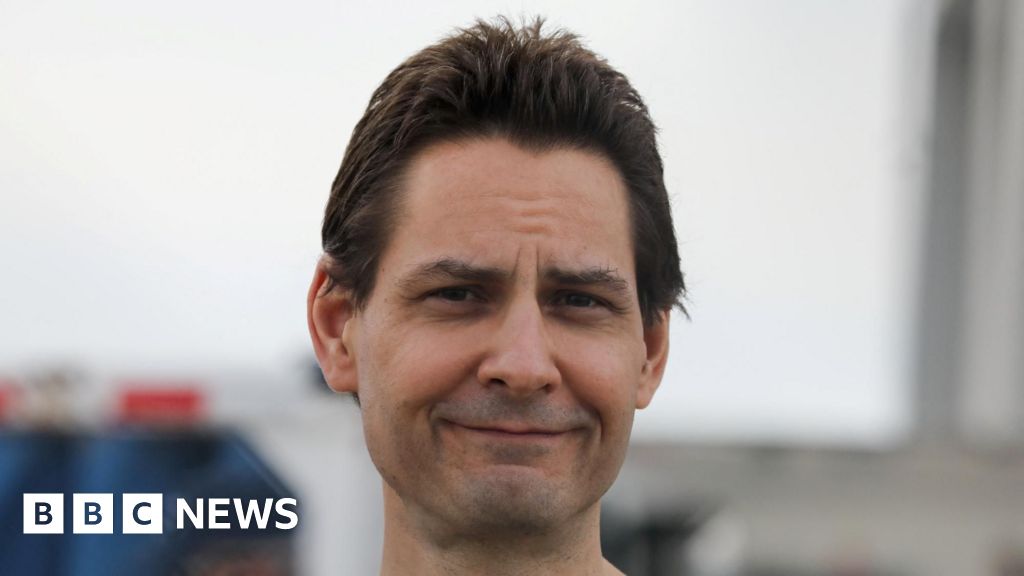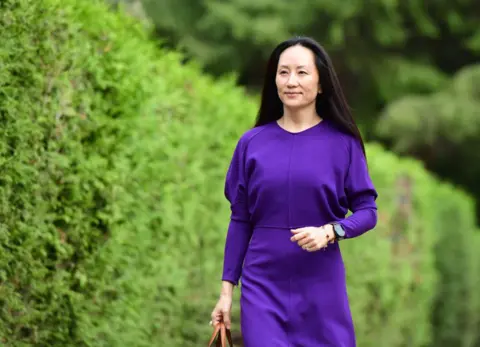Michael Kovrig: Canadian alleges ‘psychological torture’ in Chinese jail

 Reuters
ReutersA former Canadian envoy whose imprisonment in China kicked off a high-profile diplomatic spat has accused Chinese authorities of inflicting “psychological torture” on him.
Michael Kovrig says he was placed in solitary confinement for months and subjected to “relentless interrogation” when he was arrested in December 2018 and held for more than 1,000 days.
The Chinese government has rejected his allegations, saying it handled his case lawfully.
Mr Kovrig and fellow Canadian Michael Spavor were detained on spying charges following the arrest of Chinese businesswoman Meng Wanzhou in Vancouver, in a case that Canada called “hostage diplomacy”.
The Canadian government had at that time detained Ms Meng, the chief financial officer of Chinese tech giant Huawei, on US fraud charges.
The “two Michaels” were only freed nearly two years later, after US prosecutors dropped the extradition request and agreed to release Ms Meng.
“It was the most gruelling, painful thing I’ve ever been through,” said Mr Kovrig in an interview with Canadian public broadcaster CBC that aired on Monday night.
Describing his ordeal for the first time, Mr Kovrig said that on the night he was arrested he was walking home from dinner in Beijing with his partner, who was six months pregnant at the time.
“We came up a spiral staircase right in front of the plaza in front of my apartment building, and boom,” he said.
“There’s a dozen men in black with cameras on them surrounding us, shouting in Chinese, ‘That’s him.’”
Mr Kovrig, a former diplomat who was working as a senior advisor for the International Crisis Group think tank at the time, said he was then handcuffed, blindfolded and thrown into a black SUV.
After being driven for almost an hour, he was taken into a padded cell, where he would remain for several months.
“At that point they said, ‘You are under suspicion of endangering China’s state security. You are going to be interrogated,’” Mr Kovrig said. “A chill went down my spine.”
Mr Kovrig alleged his treatment by the Chinese authorities broke international law.
“The United Nations standard is no more than 15 days in solitary confinement. More than that is considered psychological torture. I was there for nearly six months,” he said.
He added that he was kept in complete isolation under fluorescent lights for six months, while being subjected to six to nine hours of interrogation a day.
Often, he said, he was locked in a chair for hours on end and at times was forced to survive on three bowls of rice per day.
“They are trying to bully and torment and terrorise and coerce you into accepting their false version of reality,” Mr Kovrig said.
After six months Mr Kovrig and Mr Spavor, who were held separately, were formally arrested.
Mr Kovrig was moved from his windowless cell to a pre-trial detention facility, where he shared a room with a dozen inmates.
“That was kind of like moving from hell to limbo,” he said, describing how this time there was daylight coming in through Plexiglass windows and room to walk around.
Mr Kovrig stayed there for the next two years, before his release in September 2021 – the same day that the US dropped its request to extradite Meng Wanzhou.
Within two hours of Ms Meng’s extradition request being dropped, he and Mr Spavor had cleared Chinese airspace on a plane to Canada, according to CBC.
Responding to Mr Kovrig’s interview, Lin Jian, a spokesman for China’s Ministry of Foreign Affairs, said that Chinese judicial authorities handled the case strictly in accordance with the law.
“Lies and smears cannot change the fact that the person you mentioned committed a crime. We advise the relevant parties to respect the facts and reflect on their mistakes,” he told reporters in Beijing on Tuesday.
 Getty Images
Getty ImagesMr Kovrig’s allegations of his treatment by the Chinese authorities stands in contrast with Ms Meng’s experience in Canada.
The heiress was released on bail and placed under house arrest, but was allowed to leave her home in the daytime and roam within a large swathe of Vancouver while under supervision.
She reportedly went on private shopping sprees at high-end boutiques, and had massages and art lessons in her mansion. Ms Meng later wrote she had time to finally “read a book cover to cover” and “carefully complete an oil painting”.
Her release was covered prominently and celebrated in China where many supported her and her father, Huawei founder Ren Zhengfei.
But the case severely strained China’s diplomatic ties with Canada and the US, with Canadian Prime Minister Justin Trudeau at one point accusing China of “using arbitrary detention as a tool to achieve political goals”.
China denied these accusations, and countered that Ms Meng’s arrest was an example of “political persecution of Chinese citizens with the aim of suppressing China’s high tech enterprises”.
World News || Latest News || U.S. News
Source link




